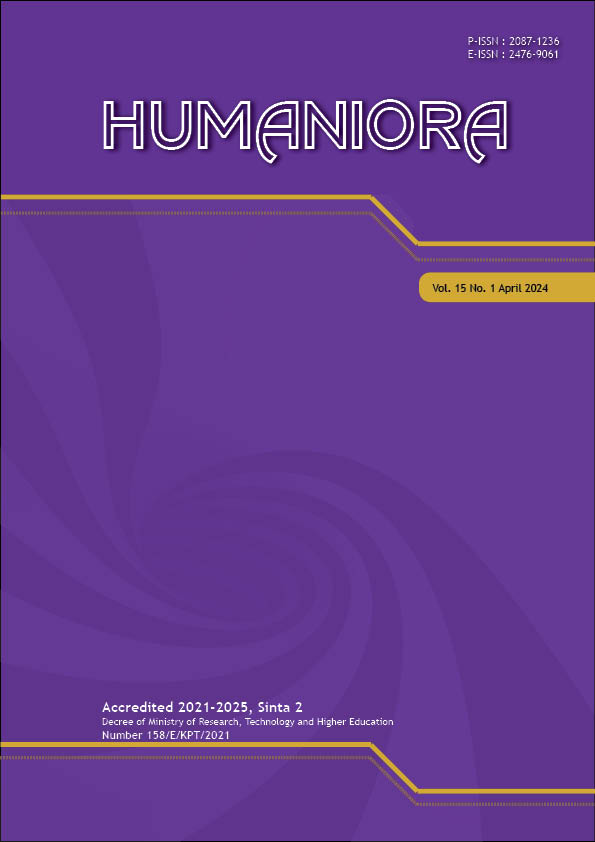Power Dynamics in the Arts Sponsorship : Activities in Bandung and Yogyakarta during COVID-19
DOI:
https://doi.org/10.21512/humaniora.v15i1.11164Keywords:
power dynamics, arts sponsorship, art practitionersAbstract
The research objectively analyzed artists’ actions and strategic reactions in the urban areas of Bandung and Yogyakarta in Indonesia during the extremely turbulent COVID-19 pandemic from March 2020 to early 2021. The pandemic greatly impacted the lives of artists and practitioners because of stringent governmental prohibitions that prohibited public art events. The research examined practitioners’ experiences concerning their reliance or autonomy from government funding when engaging in arts-related endeavors. The research methodology was based on gathering data from social media and field investigations; a comprehensive collection of posters, photos, and relevant notes was compiled using a cultural studies framework. In addition, interviews were performed with arts practitioners and communities, specifically examining their involvement on social media platforms. A detailed investigation was conducted by carefully analyzing the interview data to clarify the differences between art practitioners in Bandung and Yogyakarta. It is found that the research distinguishes between individuals who receive government sponsorship and those who operate independently. It enhances the overall comprehension of power dynamics between arts practitioners and the government in the distinct setting of the COVID-19 epidemic, including those who operated autonomously. The research utilizes a cultural studies framework to examine the power dynamics between artists and the government in the context of the COVID-19 pandemic.
References
Bonin-Rodriguez, P., & Vakharia, N. (2020). Arts entrepreneurship internationally and in the age of Covid-19. Artivate: A Journal of Entrepreneurship in the Arts, 9(1), 3-8. https://doi.org/10.34053/artivate.9.1.122.
Gu, X., Domer, N., & O’Connor, J. (2021). The next normal: Chinese indie music in a post-COVID China. Cultural Trends, 30(1), 63-74. https://doi.org/10.1080/09548963.2020.1846122.
Hall, S. (2020). Old and new identities, old and new ethnicities. In Culture, Globalization and the World-System (2nd Ed., pp. 199-208). UK: Macmillan Education UK. https://doi.org/10.1007/978-1-349-11902-8_3.
Larasati, T., & Gu, X. (2020). Creative Bandung: Interview with Tita Larasati. In Re-Imagining Creative Cities in Twenty-First Century Asia (pp. 277-282). New York, USA: Springer International Publishing. https://doi.org/10.1007/978-3-030-46291-8_19.
Lee, H. K. (2019). The new patron state in South Korea: Cultural policy, democracy and the market economy. International Journal of Cultural Policy, 25(1), 48-62. https://doi.org/10.1080/10286632.2018.1557651.
Lengauer, D. (2021). A genealogy of komunitas: Varieties of social formation and their signification in Bandung, Indonesia. The Australian Journal of Anthropology, 32(3), 309-323. https://doi.org/10.1111/taja.12411.
Martin-Iverson, S. (2021). The value of the underground: Punk, politics, and creative urbanism in Bandung, Indonesia. Cultural Studies, 35(1), 110-135. https://doi.org/10.1080/09502386.2020.1844261.
Musterd, S., & Ostendorf, W. (2004). Creative cultural knowledge cities: Perspectives and planning strategies. Built Environment, 30(3), 189-193. https://doi.org/10.2148/benv.30.3.189.54301.
Olivia, S., Gibson, J., & Nasrudin, R. (2020). Indonesia in the time of Covid-19. Bulletin of Indonesian Economic Studies, 56(2), 143-174. https://doi.org/10.1080/00074918.2020.1798581.
Panjaitan, T. W. S., Pojani, D., & Darchen, S. (2022). The transformation of public space production and consumption in post-reformation Indonesian cities. City, Culture and Society, 29, 100444. https://doi.org/10.1016/j.ccs.2022.100444.
Reyes-MartÃnez, J., & Andrade-Guzmán, C. (2023). Factors associated with the attendance at cultural events in Mexico during the Covid-19 pandemic. Cultural Trends, 32(2), 32-62. https://doi.org/10.1080/09548963.2022.2066507.
Rum, M., Adiputera, Y., & Nandyatama, R. (2020). Keterbatasan tata kelola kesehatan global dalam penanganan COVID-19. In Tata Kelola Penanganan Covid-19 di Indonesia: Kajian Awal. Yogyakarta, Indonesia: UGM Press. https://digitalpress.ugm.ac.id/book/257.
Seetharaman, P. (2020). Business models shifts: Impact of Covid-19. International Journal of Information Management, 54, 102173. https://doi.org/10.1016/j.ijinfomgt.2020.102173.
Supriatna, E. (2020). Socio-economic impacts of the COVID-19 pandemic: The case of Bandung city. Journal of Governance, 5(1). 61-70. https://doi.org/10.31506/jog.v5i1.8041.
Urkevich, L. A. (2020). Our rebirth: Reshaping the music discipline after the Covid-19 pandemic. Retrieved from https://symposium.music.org/index.php/60-1/item/11482-our-rebirth-reshaping-the-music-discipline-after-the-covid-19-pandemic.
Vandenberg, F., Berghman, M., & Schaap, J. (2021). The ‘lonely raver’: Music livestreams during COVID-19 as a hotline to collective consciousness? European Societies, 23(1), 141-152. https://doi.org/10.1080/14616696.2020.1818271.
Vincent, C. (2023). The impacts of digital initiatives on musicians during COVID-19: Examining the Melbourne digital concert hall. Cultural Trends, 32(3), 247-263. https://doi.org/10.1080/09548963.2022.2081488.
Wahyudi, M. D., & Ratnasari, A. (2016). Analisis city branding “Jogja Istimewa†dalam memasarkan daerah Yogyakarta. Prosiding Manajemen Komunikasi, 2(2), 441-448. http://dx.doi.org/10.29313/.v0i0.5049.
Downloads
Published
How to Cite
Issue
Section
License
Copyright (c) 2024 Mochamad Aviandy, Ade Ariyani Sari Fajarwati, Zeffry Alkatiri, Kresno Yulianto, Hawe Setiawan

This work is licensed under a Creative Commons Attribution-ShareAlike 4.0 International License.
Authors who publish with this journal agree to the following terms:
a. Authors retain copyright and grant the journal right of first publication with the work simultaneously licensed under a Creative Commons Attribution License - Share Alike that allows others to share the work with an acknowledgment of the work's authorship and initial publication in this journal.
b. Authors are able to enter into separate, additional contractual arrangements for the non-exclusive distribution of the journal's published version of the work (e.g., post it to an institutional repository or publish it in a book), with an acknowledgment of its initial publication in this journal.
c. Authors are permitted and encouraged to post their work online (e.g., in institutional repositories or on their website) prior to and during the submission process, as it can lead to productive exchanges, as well as earlier and greater citation of published work.
USER RIGHTS
All articles published Open Access will be immediately and permanently free for everyone to read and download. We are continuously working with our author communities to select the best choice of license options, currently being defined for this journal as follows: Creative Commons Attribution-Share Alike (CC BY-SA)




















